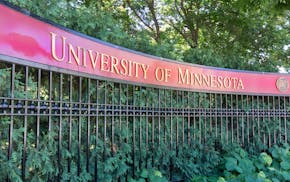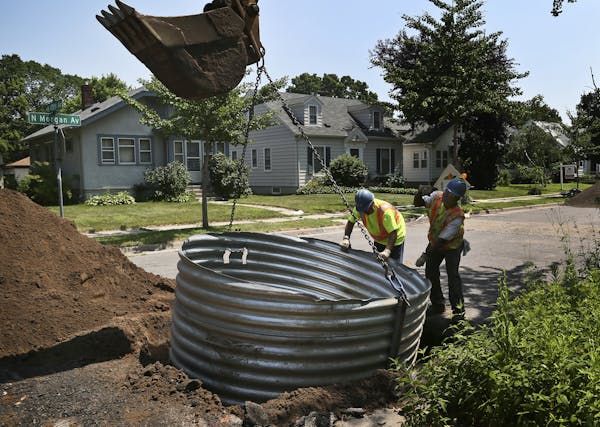Businesses along a historic street in Minneapolis were soaked early Thursday when a water line broke in the middle of the night, the fourth major break of a water pipe in Minneapolis in just over a year.
The break of the private water line — between the city main and the businesses — points to the aging private pipes that bring water to thousands of businesses and homes in Minneapolis. Many of the water mains and the service lines in the city are close to a century old.
The break occurred along St. Anthony Main, just across the Mississippi River from downtown Minneapolis. It's one of the oldest parts of the city, with some buildings dating to the 1850s.
"Our infrastructure is getting older and older, and we need investment," said Seth Spychala, president of the Minnesota section of the American Society of Civil Engineers. Age matters, he said.
Clay or cast iron meets old ground
First, older water mainlines are typically made of clay tile, which is more brittle, or cast iron, which is subject to corrosion. Older pipes also lie in ground that's had more time to settle or be invaded by tree roots over time. Today's ductile steel pipes are stronger and less brittle, he said. Typically, utilities are designed for a 50-year life, which means that much of Minneapolis is well past that. Some city water pipes are nearing 150 years old.
Water service lines from city water mains to private properties are aging along with those mains, and about 300 annually need to be replaced, according to Bernie Bullert, the city's director of water treatment and distribution.
That's the responsibility of the business owner or homeowner, and a typical residential service line replacement costs $3,000 to $5,000, he said. Typically the oldest homes have lead pipes as small as five-eighths of an inch in diameter, and a typical replacement line is 1-inch copper pipe that can better handle the demands of washers and dishwashers. The city requires replacement of lead lines.
The biggest indicators that a line may be leaking is water running down the street or diminished flow inside the building.
The break came two months after a water main broke near Target Center, sending about 90,000 gallons of water gushing into the streets. The city blamed recent rains for shifting soil near the main, which dated to 1889. Earlier this year, a backhoe tore into a 122-year-old water main, unleashing 14 million gallons of water. In August 2012, part of Nicollet Mall was closed due to a break.
About 800 miles of the city's water pipes were installed before 1920, and the very oldest were built in the 1870s in the Mill District along the Mississippi River. The city has about 40 water main breaks a year and replaces several miles of water mains each year as part of a pipe replacement program.
Floating sofa
Among the waterlogged businesses Thursday morning was the Aster Cafe, where a fire alarm went off shortly before 4 a.m. There was plenty of water but no flames. City workers got the water shut off about 4:30 a.m., city spokesman Matt Lindstrom said.
A building that houses the Aster, other dining spots and a movie theater bore the brunt of the flooding.
"The water flowed heavily from one [business] to the other, hitting all the main floors and basements," said John Rimarcik, the building's owner, who was on scene helping mop up.
"The water was several feet deep," he added. "There were 300-pound sofas floating through like a bathtub."
While Rimarcik said he expects nearly every business to be able to operate Thursday, "the Aster is going to have some problems," he said.
Rimarcik's building includes what he described as the oldest masonry in the city, dating to 1857.
There was no construction in the area, Rimarcik said, an activity that sometimes leads to water pipes being punctured. He said he believes the line just gave way on its own under one of the basements.
About 7 billion gallons of water leaks daily from U.S. pipes, mostly from small leaks or drips, and there's typically no advance warning of a break in the water line serving a house from a city main. But a Minneapolis property owner can check with the city's utility office to see whether water lines have been replaced since a home was built.
pwalsh@startribune.com • 612-673-4482
sbrandt@startribune.com • 612-673-4438

Going to the Timberwolves or Twins games tonight? Here's how to get there, and maybe even avoid traffic
Focusing on bringing football film into frame

